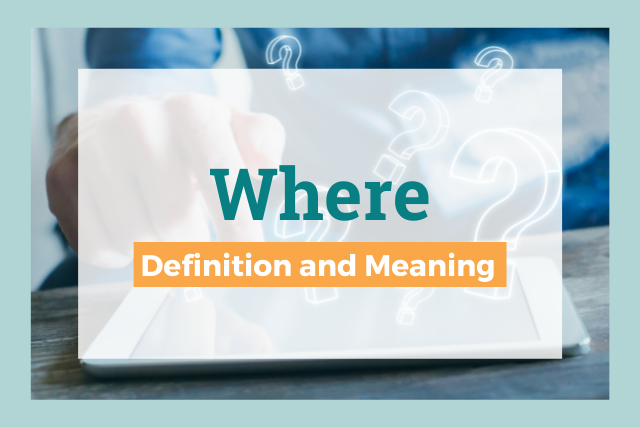
“Where” is a common English word that you’ll need to know if you’re studying the English language.
This article will explain what the word “where” means, where it originates from, and how to use it in a sentence.
What Does Where Mean?
“Where” is a word that we use to point to a specific place or situation.
We often use “where” to talk about places when we ask an indirect question, the same way we use “what” to talk about objects and “who” to talk about people.
Definition of Where
According to the Merriam-Webster Dictionary, “where” has two definitions.
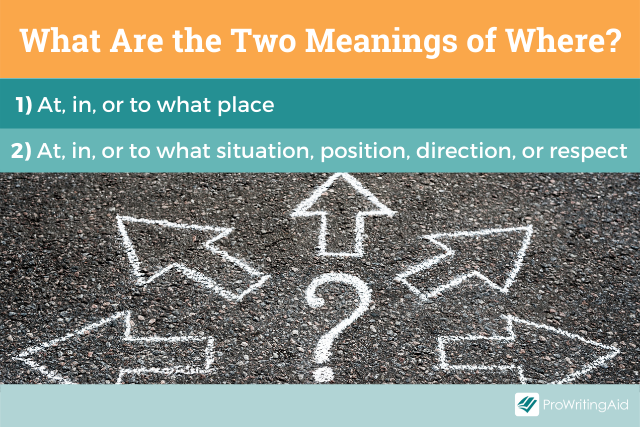
The first dictionary definition is “at, in, or to what place.”
Here are some examples of this first definition:
- “Where do you go to school?” means “At what place do you go to school?”
- “Where should I put my shoes?” means “In what place should I put my shoes?”
- “Where are you headed?” means “To what place are you headed?”
The second dictionary definition is “at, in, or to what situation, position, direction, circumstances, or respect.”
Here are some examples of this second definition:
- “Where are you in your career path?” means “In what position are you in your career path?”
- “Where does this conversation leave us?” means “In what circumstances does this conversation leave us?”
- “Where do you see our relationship going?” means “In what direction do you see our relationship going?”
What Type of Word Is Where?
“Where” can be an adverb or a conjunction.
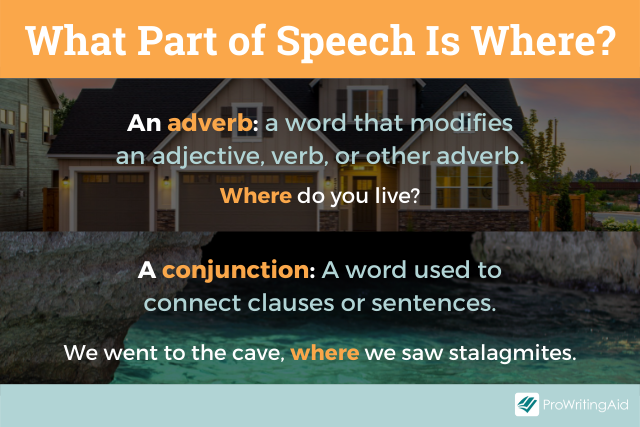
Most commonly, it’s used as an adverb (meaning “at what place” or “in what situation.”)
Sometimes, it’s used as a conjunction (meaning “in the place that” or “in the situation that.”)
Were and where are easy to confuse when writing in English. They look similar, but they are spelled and pronounced differently.
It’s easy to write the wrong thing because the only difference is one letter, but that can significantly change the meaning of what you’re trying to say. ProWritingAid’s Grammar Check will show you every instance where you’ve misused where or were.
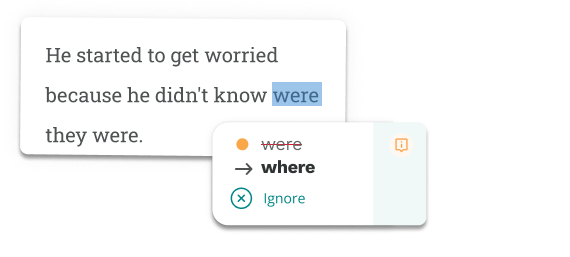
Try it with a free ProWritingAid account.
Is Where a Verb or Adverb?
“Where” is never a verb (a word used to describe an action). It is often used as an adverb (a word that modifies an adjective, verb, or another adverb).
The Correct Use of Where
There are three different ways to use “where” correctly. You can use it when referring to a physical place, a stage in a process, or a broader situation. Let's look at each of these usages in detail.
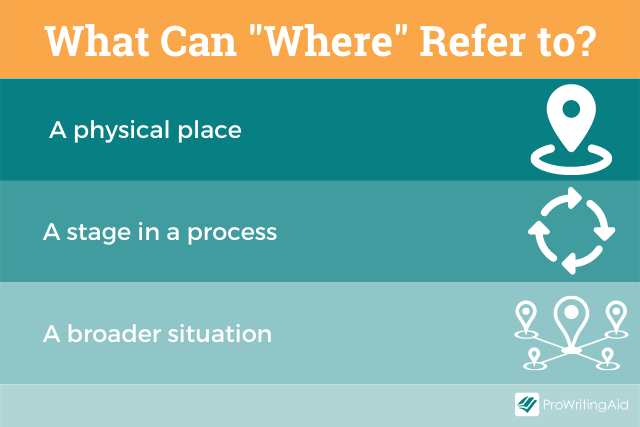
Referring to a Place
“Where” is a useful word for referring to a place.
We use “where” to ask a question if we want someone else to identify a specific place. For example, you might say “Where are you going?” to ask about the specific place someone is headed to, or “Remind me where you live” to ask about the specific place in which someone resides.
We can also use “where” to describe a place we’ve already identified. For example, you might say “Beijing, where my sister lives, is a thriving center of commerce” or “That’s the restaurant where my husband and I went on our first date.”
Referring to a Stage in a Process
We also use “where” to refer to a specific stage in a process or activity.
For example, you might say “This is the part of the dance where I always forget the next move,” or “He’s not at the age yet where he needs to decide his future career.”
Referring to a Situation
Finally, we can use “where” to refer to a situation. This works in a similar way to using “where” to refer to a place, except we’re talking about a metaphorical “place” instead of a physical location.
For example, a common question in a job interview is “Where do you see yourself five years from now?” This question asks about the situation the interviewee expects to be in, not the physical location.
Similarly, you might say “Where was I again?” when you lose your train of thought in a presentation.
More Examples of Where in a Sentence
Here are some examples of the word “where” in English literature.
“They get to their hostels at night, and as they dine they all begin to ask one another the Three Travel Questions: Where are you from? Where are you coming in from? Where are you going?”—Flights by Olga Tokarczuk
“Tell me where it hurts, she’d say. Stop howling. Just calm down and show me where.”—The Blind Assassin by Margaret Atwood
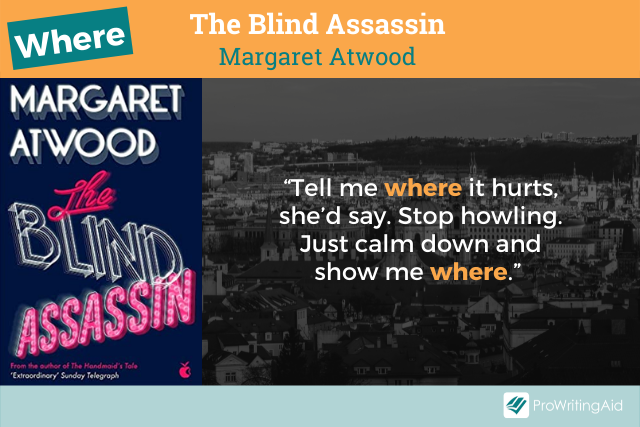
“Laurie was at the stage where, if Dan said it was raining, she’d go outside to check.”—If I Never Met You by Mhairi McFarlane
“I stopped at a little shack where a man sold hot red chili in paper containers; I bought some and ate it, strolling in the dark mysterious streets.” —On the Road by Jack Kerouac
“That’s the part I was stuck in, the part where you accept the apology because it’s easier than addressing the root of the problem.”—The Seven Husbands of Evelyn Hugo by Taylor Jenkins Reid
“War, Etienne thinks distantly, is a bazaar where lives are traded like any other commodity: chocolate or bullets or parachute silk.”—All the Light We Cannot See by Anthony Doerr
“The landscape of one’s childhood was more vibrant than any other. It didn’t matter where it was or what it looked like, the sights and sounds imprinted differently from those encountered later. They became part of a person, inescapable.”—The Secret Keeper by Kate Morton
“You know, when you have music that has all the knots sanded down and the scratches buffed out... where’s the emotion in that?”—Daisy Jones & The Six by Taylor Jenkins Reid
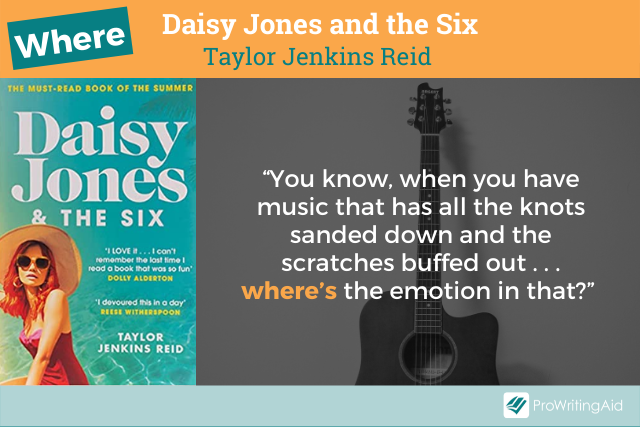
“What did it matter where you lay once you were dead? In a dirty swamp or in a marble tower on top of a high hill? You were dead, you were sleeping the big sleep, you were not bothered by things like that.”—The Big Sleep by Raymond Chandler
“How do stories end? she wondered. With comic books it was easy to tell: the closing panels were clearly indicated, the words ‘final issue’ were emblazoned on the cover. With life it was harder to figure out where anything begins and where it concludes.”—Velvet Was the Night by Silvia Moreno-Garcia
First Known Use of Where: Its Origins
The word “where” stems from the Old English word “hwǣr,” which was akin to the Old High German “hwār.” Both of those words mean the same thing that “where” means now.
Now you know what “where” means and how to use the word in any context. Was this article helpful? Let us know in the comments.


